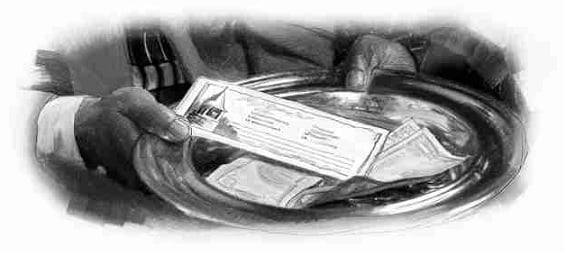Sabbath: The Impact of Tithing
Read for This Week’s Study: Mark 16:15; 1 Pet. 3:8-9; 1 Cor. 9:14; Rom. 3:19-24.
Memory Text: “Do you not know that those who minister the holy things eat of the things of the temple, and those who serve at the altar partake of the offerings of the altar? Even so the Lord has commanded that those who preach the gospel should live from the gospel” (1 Corinthians 9:13-14, NKJV).
As we saw last week, tithing is an important expression of faith. It is one way to reveal, or test, the reality of our profession. “Examine yourselves as to whether you are in the faith. Test yourselves. Do you not know yourselves, that Jesus Christ is in you? – unless indeed you are disqualified” (2 Cor. 13:5, NKJV).
The first biblical reference to tithing is Abraham’s giving tithe to Melchizedek (Gen. 14:18-20, Heb. 7:4). The Levites also took the tithe for their services at the temple (2 Chron. 31:4-10). Today the tithe is for the support of the gospel. When rightly understood, it serves as a spiritual measurement of our relationship with God.
The impact, use, importance, and method of distribution in tithing are designed for our spiritual growth in supporting God’s work and providing the financial foundation for preaching the gospel. This is God’s plan and has been called the first step that a faithful steward takes.
This week we will continue our look at tithing: its distribution, what it means to others, and what impact it has on our spiritual lives.
Study this week’s lesson to prepare for Sabbath, February 24.


For believers who know about tithing, it is true that the principle tithing will be an expression of their Christian walk.
But is it wise to be promoting tithing as a test of that profession? What might be the motives for doing so? Was this why Abraham paid tithe to Melchizedek – to pass the test and prove his profession?
Abraham’s true motivation is revealed not so much in his tithing but in what he did with the 90%. The story concerns the spoils of war, and after paying tithe to Melchizedak, he gave the rest back to the released captives, except for what his own workers had eaten. Further, he said that the other leaders that had been with him would have to make up their own minds on what to do with their share. Abraham made it very clear he was not going to profit from the situation.
It appears the commentator of today lesson is trying to connect tithing with our relationship with God, however, God love us, unconditionally. Again legalism pay a great part in scaring people into doing thing…Martin Luther, found that Righteous by faith. And it is a Gift form God, and this righteousness is not a contributing factor between tithing and salvation.
That if we pay tithes we connected with God and if we don’t pay tithes, as the lesson says DISQUALIFIED.
Matthew 23
23 “Misery is yours, you who teach a legal religion, you penal theologians, you counterfeits! You keep rules, such as proudly paying a pre-tax tithe and even giving a tenth of the herbs in your garden, but you fail to do what actually matters–to live in harmony with God’s Law, which is his design for life. You fail to ‘do what is right because it is right.’ You are not merciful but judgmental and critical, and you cannot be trusted to protect those struggling with sin. You should have lived lives of love for others, without neglecting the simple instructions of God.24 You are truly irrational and unthinking teachers! You are so focused on keeping the rules—such as dietary laws—that you fail to understand that their purpose is to promote health. You’re so confused that you actually think it would be a virtue to die of starvation rather than eat something not on the ‘approved’ list.
In the KJV of Matt 23:23 Jesus states, speaking in reference to the weightier matters of law, judgement mercy, and faith, that “these ye ought to have done without leaving the others undone”. He doesn’t diminish the importance of the Pharisee’s tithing practices but addresses the deficiency of their motives and their obsesssion with maintaining their self righteous image. Tithing, as with any other religious practice, can be exercised as an expression of legalism, just as feeding the hungry at a soup kitchen can be. However, the fact it may be an object of legalism does not mean that it can’t be a measure or test of our faithfulness to God. The acid test is the motive.
I too was a bit stunned when the lesson indicated it was going to turn back to tithing, particularly after the texts that would be used as the basis of study this week in the Sabbath lesson. I would hope from these texts that there is a connection made through grace. Out of the stunning revelation that there is no one worthy, save Jesus Christ the righteous, and it is only by His grace that salvation is bestowed on us and we respond by helping to provide the means to spread that story.
2 Corinthians 9:6-7 ESV
6 The point is this: whoever sows sparingly will also reap sparingly, and whoever sows bountifully will also reap bountifully. 7 Each one must give as he has decided in his heart, not reluctantly or under compulsion, for God loves a cheerful giver.
Enjoying analysis from Lusaka,Zambia.Amen!